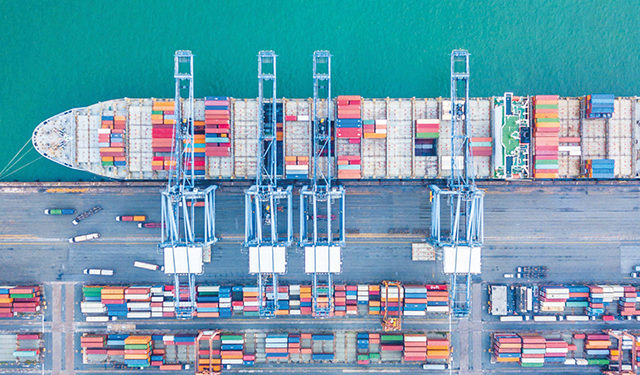China’s ambitious Belt and Road Initiative (BRI), a near-trillion US dollar Chinese initiative aimed at linking the Indo-Pacific region with the vast European market, and Georgia’s geographical position as the shortest way from China to Europe, has given a promising start to Georgia-China relations.
Today, however, not all is as rosy as back in 2017 when China and Georgia signed a free trade agreement and the Georgian government hoped the country’s position on the Black Sea, with several ports such as Batumi, Poti and the then-planned Anaklia deep sea port, would turn the country into a logistics hub not only for the entire region but also for the expanding BRI. Georgia also hoped to use its main land transport road, the East-West Highway, and the Baku-Tbilisi-Kars (BTK) railway, which link the Caspian Sea to the Black Sea and Turkey, as focal points in its emerging strategy of positioning itself as a major transit route. Fostering closer ties with China was also seen as a vital component of Georgia’s quest to balance Russia’s regional influence, and as a hedge against Russian military moves in occupied Abkhazia and South Ossetia.
The hopes for improvements in trade have not yet been realized. While there has been a steady increase in overall numbers, statistics show that for China, Georgia serves mostly as a raw material base, with trade dominated by the export of copper and various chemicals to China. Georgia’s hopes of using the vast Chinese market for higher value chain products has not materialized. Similarly, concerns over shady practices have increased, especially tied to how Chinese companies have been awarded contracts. One illustrative case concerns Powerchina’s subsidiary Sinohydro, which won a €26.3 million (GEL95 million) tender for the reconstruction of a 42-kilometer section of the Khulo-Zarzma road in Georgia.
Furthermore, it has become apparent to policymakers in Tbilisi that China will not compromise increasingly important relations with Russia because of its business interests in Georgia. For example, China has abstained, and generally been unhelpful, on key diplomatic issues critical to the Georgian side. It repeatedly failed to back Georgia’s UN vote on refugees forcefully expelled from Abkhazia and South Ossetia by separatists and Russian troops. It also repeatedly failed to denounce de-facto presidential or parliamentary elections held in Georgia’s occupied territories. China has also stayed silent on Russian cyber-attacks against Georgia over the last few years, as well as on Russian “borderization” policies in South Ossetia. Its Ministry of Defense even announced that it would participate in the Russian-led “Kavkaz-2020” exercises, alongside troops from Abkhazia and South Ossetia.
In September 2020, the Chinese state media outlet China Daily questioned the utility of the US-funded Lugar Laboratory being located near Georgia’s border with Russia, and alleged that it both represented a biohazard risk to Georgia, and that Georgian citizens were being unwittingly used as test subjects.
Though increasingly disenchanted with China, Georgian leaders are still trying to walk a diplomatic tightrope, keen to not draw ire from China. But as the American stance on China hardens, it will be more and more difficult to maintain this balance.
The balancing act is also unsustainable because of Georgia’s NATO/EU membership aspirations, the cornerstone of its geopolitical orientation, which are an irreconcilable irritant for China, especially as the Alliance expands its scope to face down China’s growing military ambitions in the Indo-Pacific region.
At this point, criticizing China openly would cost Georgia a lot, which means that Tbilisi taking a firm stance on Taiwan or on human rights issues is not likely. But as tensions ratchet up between the West and China, we should expect Georgia to side more firmly with the West, not only politically, but also increasingly economically, by embracing Western 5G technologies as well as trade and investment standards. The recent memorandum of understanding signed between the US and Georgian governments on using technologies based on Western standards, reinforces the emerging tilt.
This fits into the overall ambivalence of the Chinese position regarding the South Caucasus. The country’s ambassadors to the region’s three states, Armenia, Azerbaijan, and Georgia, often announce how important the Caucasus is, but Beijing’s investment policies and general political moves reflect little of the expected grand geopolitical thinking.
But to consider China’s position, we need to look at the bigger picture. For China, the South Caucasus holds a modest role. Trade with the states is growing, but the numbers are not as high as one could have hoped for. Geography matters in understanding the limits of Chinese engagement. Unlike Central Asia, the South Caucasus does not border on China, and unlike Central Asia, the region does not represent a primary security concern for Beijing either.
Furthermore, China’s stance on the region cannot be disengaged from Beijing’s position on the Black Sea. In fact, China’s evolving vision of the South Caucasus is contingent upon what it can garner in the Black Sea. The latter is strategically located, providing connection to Eastern, Central, Southern Europe, and Russia. It also allows access to the Mediterranean through the Bosphorus and Dardanelle Straits. Being involved in this sea would offer serious geopolitical opportunities to China, but much depends on energy availability. As the demand on oil and gas resources in China increases, so does Beijing’s quest to find new energy sources and safe avenues for import.
As trends indicate, the Black Sea does not stand out in this regard. So far, Chinese companies have shown little interest in investing in the Black Sea littoral states. It could be suggested that the reason is the unknown scale of gas and oil deposits in the Black Sea, hence negligible Chinese investments in its hydrocarbons and the limited significance of the Black Sea as a transit route for China’s growing energy demands.
Additionally, the Black Sea littoral states, with the exception of Russia (although even the latter exports gas and oil to China from its deposits in Siberia), have little to no direct energy trade with China. Overall, the resource potential of the Black Sea is too uncertain to merit deeper Chinese involvement. Even with Turkey, which recently made gas findings in the Black Sea, the Chinese stance is unlikely to change, as the potential gas deposits would mostly be consumed by Turkey’s growing internal demands.
Thus Georgia-China relations should be seen in the light of US-China competition. Georgia will have to stick to the western practices, though occasionally there will arise questions regarding Chinese economic activities in Georgia. Overall, Beijing’s interests in the country will remain limited to a few important infrastructure projects, and no change in the grand strategic vision is likely to take place.
By Emil Avdaliani
Image source: fpri.org














